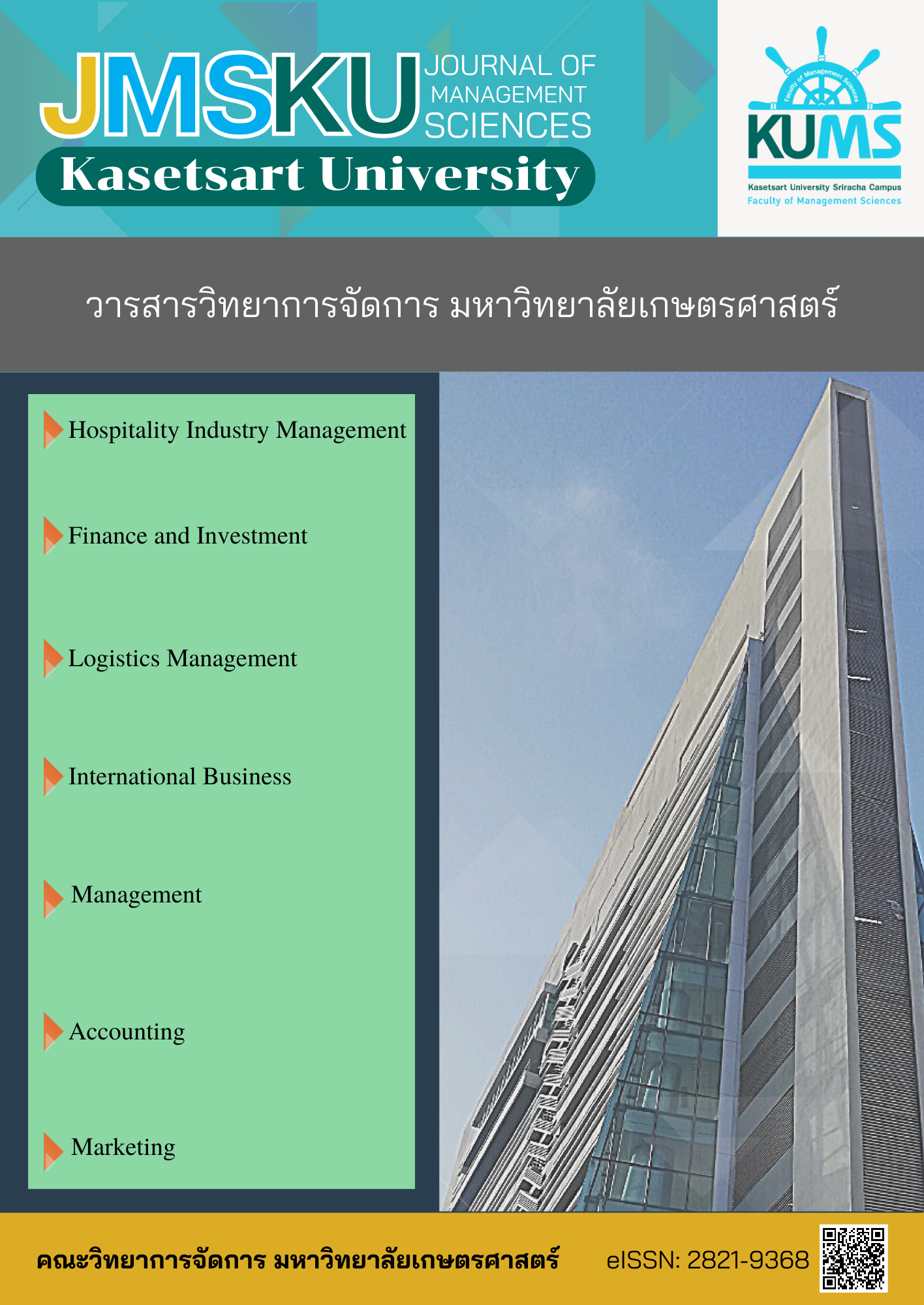แนวทางการปรับตัวเพื่อความอยู่รอดของผู้ประกอบการธุรกิจโรงแรม และรีสอร์ทในยุคแห่งการพลิกโฉมทางธุรกิจของประเทศไทย
##plugins.themes.bootstrap3.article.main##
บทคัดย่อ
วัตถุประสงค์ของการวิจัยครั้งนี้เพื่อศึกษาแนวทางการปรับตัวเพื่อความอยู่รอดของผู้ประกอบการธุรกิจโรงแรมและรีสอร์ทในยุคแห่งการพลิกโฉมทางธุรกิจของประเทศไทย การวิจัยใช้ระเบียบวิธีเชิงคุณภาพโดยการสัมภาษณ์เชิงลึกผู้ประกอบการธุรกิจโรงแรมและรีสอร์ทที่มีผลประกอบการสูงในประเทศไทย 152 แห่ง จำนวน 152 คน จากการเลือกผู้ประกอบการแบบเจาะจงตามคุณสมบัติที่กำหนด การเก็บรวบรวมข้อมูลโดยใช้แบบสัมภาษณ์แบบมีโครงสร้างแบบเปิด การวิเคราะห์ข้อมูลแบบสารัตถภาพและสัมพันธภาพ วิธีดำเนินการวิจัยมี 4 ขั้นตอน ได้แก่ (1) ขั้นการศึกษาเอกสารและรายงานการวิจัยที่เกี่ยวข้อง (2) ขั้นการเก็บข้อมูลและกำหนดองค์ประกอบ (3) ขั้นการวิเคราะห์และสังเคราะห์องค์ประกอบ และ (4) ขั้นการตรวจสอบและยืนยันแนวทางที่เหมาะสมโดยการสัมมนาอิงผู้เชี่ยวชาญ จำนวน 9 คน ผลการวิจัยพบว่า แนวทางการปรับตัวเพื่อความอยู่รอดของผู้ประกอบการโรงแรมและรีสอร์ทในยุคแห่งความผันผวนทางธุรกิจของประเทศไทยมีองค์ประกอบที่สำคัญ 5 องค์ประกอบ ได้แก่ (1) การจัดการตอบสนองต่อความต้องการ (2) การเปลี่ยนแปลงทางธุรกิจดิจิทัล (3) การปรับกรอบความคิด (4) การจัดการทรัพยากรอย่างคุ้มค่า และ (5) การเป็นผู้ประกอบการมืออาชีพ โดยมี 11 ตัวบ่งชี้ ได้แก่ (1) การกำหนดวิสัยทัศน์และกลยุทธ์ที่มีประสิทธิภาพ (2) การกำหนดโครงสร้างและทรัพยากรองค์กรที่เหมาะสม (3) การสร้างวัฒนธรรมองค์กรที่สนับสนุนการก่อเกิดนวัตกรรมการบริการทุกมิติ (4) รูปแบบ กระบวนการและการปฏิบัติที่เอื้อต่อการจัดการตอบสนองต่อความต้องการ (5) การประยุกต์ใช้แพลตฟอร์มดิจิทัลที่เหมาะสมสำหรับการบริการ (6) ทีมผู้นำเชิงปรับตัวที่มุ่งมั่นไปสู่การเป็นองค์กรแห่งนวัตกรรมการบริการอย่างเป็นระบบ (7) ทีมงานมีนิสัยแห่งนวัตกรรมในการสร้างสรรค์ผลงานที่มีคุณภาพ (8) การสร้างบรรยากาศและระบบนิเวศที่มีอัตลักษณ์เฉพาะตัว (9) นวัตกรรมการจัดการความรู้และการแลกเปลี่ยนเรียนรู้ที่มีประสิทธิผล (10) การปรับกรอบความคิดและพฤติกรรมเชิงสร้างสรรค์ และ (11) การสร้างแรงจูงใจให้เกิดการเรียนรู้เชิงดิจิทัลทั่วทั้งองค์กร
##plugins.generic.usageStats.downloads##
##plugins.themes.bootstrap3.article.details##
เอกสารอ้างอิง
Agyapong, A., Maaledidong, P.D., and Mensah, H.K. (2021). Performance outcome of entrepreneurial behavior of SMEs in a developing economy: the role of international mindset. Journal of Strategy and Management, 14(2), 227-245. DOI: https://doi.org/10.1108/JSMA-07-2020-0173
Alamäki, A., and Korpela, P. (2021). Digital transformation and value-based selling activities: seller and buyer perspectives. Baltic Journal of Management, 16(2), 298-317. DOI: https://doi.org/10.1108/BJM-08-2020-0304
Andersson, S., Awuah, G.B., Aagerup, U., and Wictor, I. (2020). How do mature born globals create customer value to achieve international growth?. International Marketing Review, 37(2), 185-211. DOI: https://doi.org/10.1108/IMR-11-2018-0340
Anh, D.L.T., and Gan, C. (2021). The impact of the COVID-19 lockdown on stock market performance: evidence from Vietnam. Journal of Economic Studies, 48(4), 836-851. DOI: https://doi.org/10.1108/JES-06-2020-0312
Bae, B.R. (2021). Effects of service authenticity, customer participation and customer-perceived service climate on customers’ service evaluation. Asia Pacific Journal of Marketing and Logistics, 33(5), 1239-1254. DOI: https://doi.org/10.1108/APJML-11-2019-0673
Cavallo, A., Ghezzi, A., and Ruales Guzmán, B.V. (2020). Driving internationalization through business model innovation: Evidences from an AgTech company. Multinational Business Review, 28(2), 201-220. DOI: https://doi.org/10.1108/MBR-11-2018-0087
Chen, J., Liu, L., and Wang, Y. (2021). Business model innovation and growth of manufacturing SMEs: a social exchange perspective. Journal of Manufacturing Technology Management, 32(2), 290-312. DOI: https://doi.org/10.1108/JMTM-03-2020-0089
Cimini, C., Boffelli, A., Lagorio, A., Kalchschmidt, M., and Pinto, R. (2021). How do industry 4.0 technologies influence organisational change? An empirical analysis of Italian SMEs. Journal of Manufacturing Technology Management, 32(3), 695-721. DOI: https://doi.org/10.1108/JMTM-04-2019-0135
Creswell, J.W. (2023). Research Design: Qualitative, Quantitative and Mixed Methods Approaches. Singapore: SAGE Publications, Inc.
Flores-Garcia, E., Bruch, J., Wiktorsson, M., and Jackson, M. (2021). Decision-making approaches in process innovations: an explorative case study. Journal of Manufacturing Technology Management, 32(9), 1-25. DOI: https://doi.org/10.1108/JMTM-03-2019-0087
Franquesa, J., and Vera, D. (2021). Small business debt financing: the effect of lender structural complexity. Journal of Small Business and Enterprise Development, 28(3), 456-474. DOI: https://doi.org/10.1108/JSBED-01-2020-0013
Free, C., and Hecimovic, A. (2021). Global supply chains after COVID-19: the end of the road for neoliberal globalisation?. Accounting, Auditing & Accountability Journal, 34(1), 58-84. DOI: https://doi.org/10.1108/AAAJ-06-2020-4634
INSEAD. (2020). Building Competitiveness and Business Performance with ICT. INSEAD eLab ICT Report. New York: The Business School for the World
Javed, A., Yasir, M., Ali, M., and Majid, A. (2021). ICT-enabled innovation, enterprise value creation and the rise of electronic social enterprise. World Journal of Entrepreneurship, Management and Sustainable Development, 17(2), 189-208. DOI: https://doi.org/10.1108/WJEMSD-01-2020-0004
Jedynak, M., Czakon, W., Kuźniarska, A., and Mania, K. (2021). Digital transformation of organizations:
what do we know and where to go next?. Journal of Organizational Change Management, 34(3), 629-652.
Konst (e. Penttilä), T., and Kairisto-Mertanen, L. (2020). Developing Innovation Pedagogy Approach. On the Horizon, 28(1): 45-54. DOI: https://doi.org/10.1108/OTH-08-2019-0060
Kumar, J. (2021). Understanding customer brand engagement in brand communities: an application of psychological ownership theory and congruity theory. European Journal of Marketing, 55(4), 969-994. DOI: https://doi.org/10.1108/EJM-04-2018-0290
Lai, F.Y., Tang, H.C., Lu S.C., and Lee, Y.C. (2020). Transformational Leadership and Job Performance: The Mediating Role of Work Engagement. SAGE Open, January-March 2020: 1–11. DOI: https://doi.org/10.1177/2158244019899085
Li, F. (2020). Leading digital transformation: three emerging approaches for managing the transition. International Journal of Operations & Production Management, 40(6), 809-817. DOI: https://doi.org/10.1108/IJOPM-04-2020-0202
Nsereko, I., Mayanja, S.S., and Balunywa, W. (2021). Prior knowledge and social entrepreneurial venture creation: the mediating role of novelty ecosystem. World Journal of Entrepreneurship, Management and Sustainable Development, 17(2), 260-273. DOI: https://doi.org/10.1108/WJEMSD-04-2020-0031
Pauluzzo, R. (2021). The imitation game: building cultural intelligence as a social learning capability to boost SMEs’ international performance. Journal of Small Business and Enterprise Development, 28(3), 317-336. DOI: https://doi.org/10.1108/JSBED-02-2019-0061
Peter, M.K., Kraft, C., and Lindeque, J. (2020). Strategic action fields of digital transformation: An exploration of the strategic action fields of Swiss SMEs and large enterprises. Journal of Strategy and Management, 13(1), 160-180. DOI: https://doi.org/10.1108/JSMA-05-2019-0070
Phuriruengkit, D., Khantanapha, N., and Piriyakul, R. (2023). Management Model for Environmentally Friendly Business Operations of Industrial Factories in Nakhon Ratchasima Province. RICE Journal of Creative Entrepreneurship and Management, 4(1), 77-92
Ratchavieng, A., Phakamach, P., Syers, S., Srinet, S., and Pengchuay, W. (2021). An innovative organization model for efficient industrial business operations in the digital era under new normal situation in Thailand. NEU Academic and Research journal, 11(3), 184-200.
Resnick, S.M., Cheng, R., Simpson, M., and Lourenço, F. (2016). “Marketing in SMEs: a “4Ps” self-branding model. International Journal of Entrepreneurial Behavior & Research, 22(1), 155-174. DOI: https://doi.org/10.1108/IJEBR-07-2014-0139
Sadangharn, P. (2021). The success of start-up business at the Eastern economic corridor. Business Review, 13(2), 62-75.
Santos, R.S., Sun, S.L., and Luo, X. (2020). invisaWear: evolving the entrepreneurial mind-set. The CASE Journal, 16(4), 393-414. DOI: https://doi.org/10.1108/TCJ-12-2019-0126
Sriram, R.M., and Vinodh, S. (2021). Analysis of readiness factors for Industry 4.0 implementation in SMEs using COPRAS. International Journal of Quality & Reliability Management, 38(5), 1178-1192. DOI: https://doi.org/10.1108/IJQRM-04-2020-0121
Topleva, S.A., and Prokopov, T.V. (2020). Integrated business model for sustainability of small and medium-sized enterprises in the food industry: Creating value added through ecodesign. British Food Journal, 122(5), 1463-1483. DOI: https://doi.org/10.1108/BFJ-03-2019-0208
Walsh, J.N., and O'Brien, J. (2021). The role of information systems and knowledge codification for service provision strategies. Journal of Service Theory and Practice, 31(3), 318-350. DOI: https://doi.org/10.1108/JSTP-06-2020-0138
Wattanakomol, S. (2021). The effect of guidelines on reducing logistics costs. Uncertain Supply Chain Management, 9(3), 667-674. DOI: https://doi.org/10.5267/j.uscm.2021.5.003
Wattanakomol, S., and Silpcharu, T. (2022). “Second-order confirmatory factor analysis of auto parts manufacturing industry management guidelines for sustainable success. Uncertain Supply Chain Management, 10(1), 905-912. DOI: https://doi.org/10.5267/j.uscm.2022.3.004
World Bank. (2023). Global Economic Prospects. January 2024. Washington DC: World Bank.
Yang, J., Xie, H., Yu, G., and Liu, M. (2019). Turning responsible purchasing and supply into supply chain responsiveness. Industrial Management & Data Systems, 119(9), 1988 DOI: https://doi.org/10.1108/IMDS-01-2019-0029
